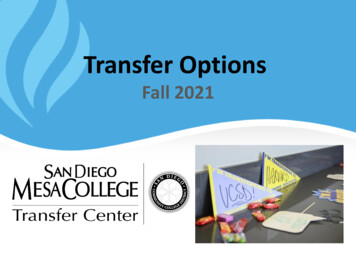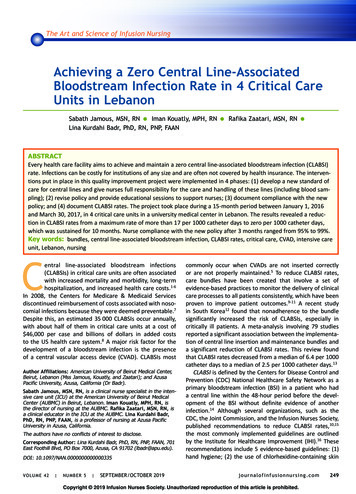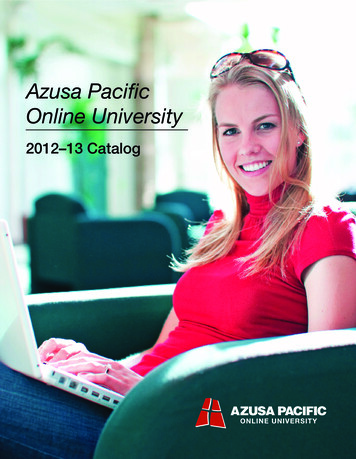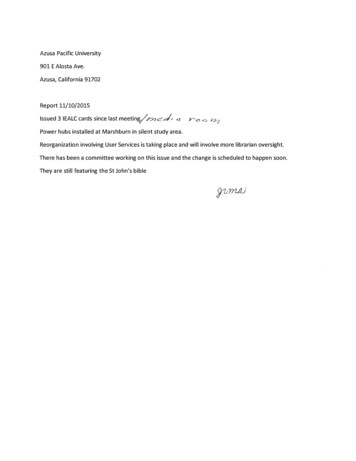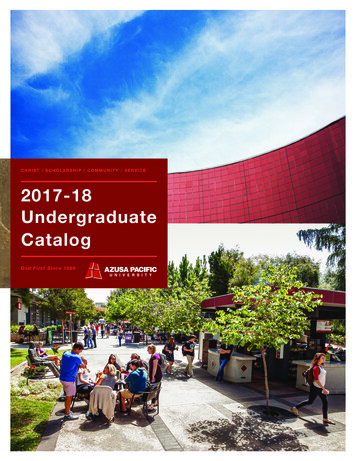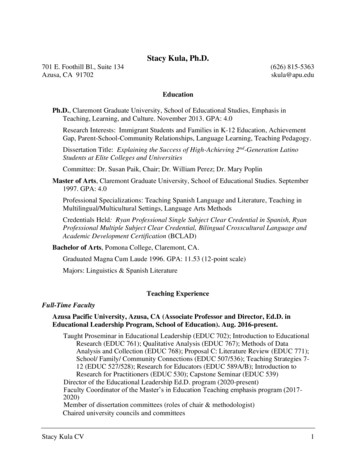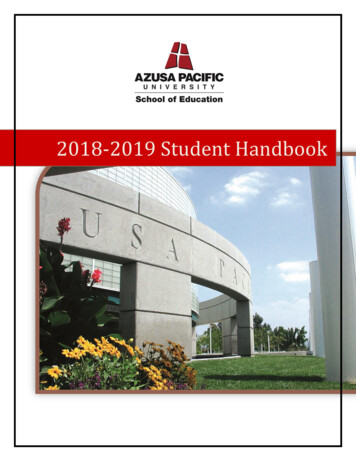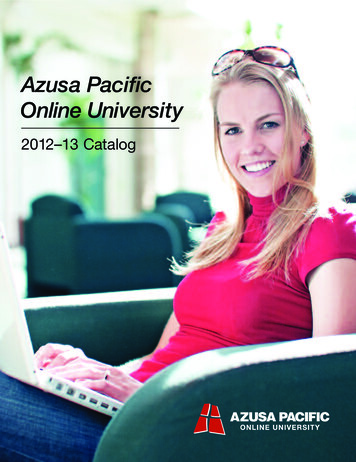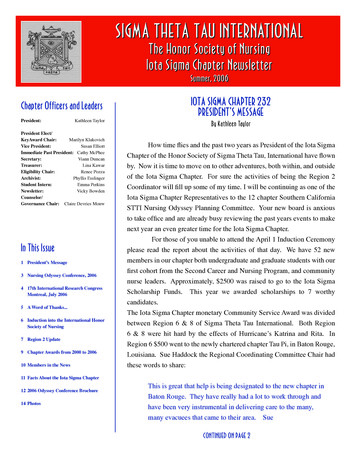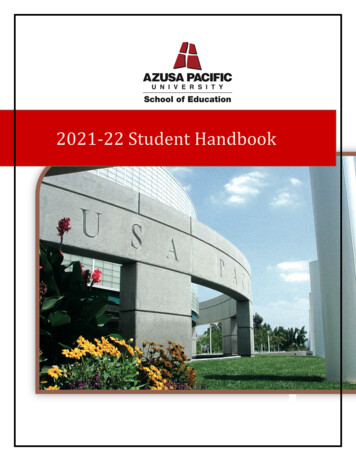
Transcription
2021-22 Student Handbook
Table of ContentsAbout the School of Education . 3University Catalog . .6Academic Integrity and Student Codes of Conduct .7Campus Resources . 8Academic Calendar . .9Academic Advising. 10Course Cancellation .11Taskstream . 11Student Dispositions . 12Graduate Grading Scale . 17Office of Credentials . 17School of Education Office of Alumni and Professional Services . 18Scholarships . 19APU Email . 19Frequently Asked Questions .19
About the School of EducationWelcome to the School of Education at Azusa PacificUniversity! We are so excited that you have decided tobecome a member of the next generation of great educators.We look forward to partnering with you as you develop asboth a professional and an individual.Since 1963, the School of Education has championed atradition of excellence, building a reputation for producingmany of Southern California’s finest professionalsclassroom teachers, school counselors and psychologists,principals, and superintendents. These APU graduates aremaking a lasting difference as creative, collaborative, andcompassionate educators and dedicated advocates forstudents’ growth and development.Did You Know? APU is a recognized leader in K-12education since 1963.APU is one of the state’s top 10credentialing institutions.APU is actively engaged with 200 schools and school districts.APU is 1 of 4 private/independentCalifornia universities with NASPapproval.Mission StatementBased upon Christian values and principles, the APU School of Education prepares educators to be creative,collaborative, critical thinkers and scholars for diverse educational settings.3
School of Education Conceptual FrameworkThe School of Education’s conceptual framework emphasizes the development of ethical, responsive, andinformed individuals by faculty with these same characteristics, within the context of the four cornerstones ofAzusa Pacific University — Christ, Scholarship, Community, and Service.Programs OfferedThe School of Education offers comprehensive education programs in the following areas of study: Elementary and Secondary EducationSpecial EducationSchool Counseling and School PsychologyEducational LeadershipEducational Technology4
Accreditation Azusa Pacific University is accredited by the WASC Senior College and University Commission(WSCUC).The School of Education is accredited by the National Council for Accreditation of Teacher Education(NCATE), which is transitioning to the Council for the Accreditation of Educator Preparation (CAEP).The School of Education credential programs are approved by the California Commission on TeacherCredentialing (CTC).The Educational Specialist Degree in School Psychology and Master of Arts in Education: EducationalPsychology with embedded Pupil Personnel Services Credential in School Psychology programs areapproved by the National Association of School Psychologists (NASP).The Board Certified Behavior Analyst (BCBA) course sequence is approved by the Behavior AnalystCertification Board (BACB).Contact ListThe following staff members assist each specific School of Education program/office:Division of Teacher EducationDivision of Teacher Education, Administrative ManagerJoy Karavedasjkaravedas@apu.edu626-815-6018Division of Teacher Education, Program CoordinatorJulie Maganajmagana@apu.edu626-387-5791Division of Teacher Education, Program CoordinatorMary Biroscakmbiroscak@apu.edu626-815-5490Liberal Studies, Administrative AssistantSabrina Castroscastro@apu.edu626-387-5718Office of Student Placements, Student PlacementsManagerOffice of Student Placements, Student PlacementsCoordinatorErika Crevelingecreveling@apu.edu626-815-5353Evan Gallagheremgallagher@apu.edu626-815-5345Department of School Counseling & School PsychologySchool CounselingCarol Tuthillctuthill@apu.edu626-815-5026School PsychologyRose Britorbrito@apu.edu626-815-5467Department of Educational LeadershipDoctoral Program in Educational LeadershipCarmen Fairleycfairley@apu.edu626-815-5374School of Education Dean’s OfficeAdministrative ManagerKelli McIntoshkmcintosh@apu.edu626-815-5348Events and Communications CoordinatorAmy Parkaypark@apu.edu626-815-5340Outreach and Alumni/Professional Servicessoealumni@apu.eduAcademic Affairssoeacademicaffairs@apu.eduOffice of CredentialsCredential AnalystPriscilla Guerrapguerra@apu.edu(626) 387-5721Credential AnalystAnn Plumbaplumb@apu.edu(626) 815-5445Credential AnalystWendy Ramseywramsey@apu.edu(626) 815-5455Credential AnalystLacey Romanolromano@apu.edu(626) 815-5093Office ManagerSalli Throopsthroop@apu.edu(626) 815-53465
University CatalogThe University Catalog is the official guide to academic programs at Azusa Pacific University and includesinformation about graduate academic policies and procedures and undergraduate academic policies andprocedures, as well as general descriptions of academic programs, and degree requirements. The catalog alsoconsists of information regarding APU’s institutional beliefs such as the faith statement, mission statement,essence statement, and Cornerstones.Please refer to the APU University Catalog for comprehensive information regarding university policiesaffecting academic policies. It is the student’s responsibility to also be aware of any policies orrequirements that are specific to their program. Below are select sections within the Catalog that areimportant for School of Education students:Undergraduate StudentsConcurrent EnrollmentCourse PoliciesMajor and Minor PoliciesRegistering for ClassesWithdrawal from CoursesWithdrawal from the UniversityClassification of StudentsIncomplete GradesAcademic Policy ExceptionsGrade Appeal PolicyAcademic Grievance PolicyRepeated CoursesTransfer CreditWaiversGraduate StudentsEnrollmentAdding and Dropping ClassesAdministrative WithdrawalLate EnrollmentWithdrawal from CoursesWithdrawal from the UniversityLeaves of AbsenceCourse IncompletesPetition ProcessGrade Change ProcessGrievance and Appeal ProceduresRepeated CoursesTransfer CreditWaiversAll School of Education students need to be familiar with School of Education Academic Policies and withSchool of Education Program Expectations.Incompletes for Graduate StudentsIn addition to the graduate catalog policy regarding course incompletes, the School of Education has adoptedthe following additional guidelines for course incompletes: The Graduate Catalog specifies "the grade IN (Incomplete) is to be given only if special circumstancesexist." As a general rule, "special circumstances" refers to an illness or other extenuating circumstancethat legitimately prevents completion of the course requirements by the end of the academic term. An incomplete cannot be granted because of a student's failure to complete work, or as a means ofimproving a grade already earned within the specified grading period. Furthermore, an incomplete should only be issued if attendance has been satisfactory up to the last dayto withdraw in the term. In addition, students should have completed at least 75% of the coursework. To obtain an incomplete, the student must fill out the Graduate Incomplete Form and obtain allnecessary signatures before the last day of the term. However, it should be noted that submission of an6
Incomplete Form does not guarantee approval. As such, students should be encouraged to submit theircompleted forms prior to the last week of class to allow sufficient time for processing.“The grade IN (Incomplete - No Paperwork) is a temporary grade issued while the Incomplete Formis in process” (e.g., the form has been filed with the Office of the Dean but has not been processed).Students should be aware that a grade of I or IN can only be assigned if an Incomplete Form has alreadybeen submitted.While the Graduate Catalog states, “An Incomplete may be granted for up to 12 weeks from the lastday of the term.” However, 12 weeks should not be automatic, and it is not advisable for programsthat are taught in 8-week sessions to allow completion of remaining course requirements to extendbeyond an additional eight weeks. Faculty are encouraged to extend the least amount of time neededto complete the remaining coursework, so as to not disadvantage students by having courseworkoverlap significantly into future terms.Academic Integrity and Student Codes of ConductThe University’s academic integrity policies are educational tools for guiding faculty, staff, and students increating a sense of community and for expressing the values that are at the core of a Christian university. Theacademic integrity policies speak to the responsibilities faculty, staff, and students have to one another to befaithful in attempts to represent others’ views, and it helps in understanding responsibilities toward academicscholarship aligned to the moral standards of the APU community. Please refer to the Academic IntegrityPolicy website to access undergraduate and graduate academic integrity policy brochures and violationreporting forms.Azusa Pacific University is an institution built on the Four Cornerstones: Christ, Scholarship, Community, andService. The Community Cornerstone is foundational to our standards of conduct. Visit the university catalogfor more information about standards of conduct for graduate students. Community living expectations forundergraduate students are available on the University website.7
Campus ResourcesAPU provides a number of resources to assist students with their academic success. Below are descriptions fora few of those resources, as well as links to the resources on the main APU website:The Graduate and Professional Center: The Graduate and Professional Center serves as the hub ofresources and services for graduate students. The Offices of Student Financial Services, Registrar, and StudentSupport Services work as an integrated team to provide students with the tools they need to proceed throughtheir graduate academic program.The Undergraduate Enrollment Services Center: APU’s Undergraduate Enrollment ServicesCenter offers a central location for undergraduate enrollment and financial services information and resources.Accessibility and Disability Resources: Accessibility and Disability Resources (ADR) coordinates anumber of direct services for undergraduate and graduate students with specific disabilities. Upon documentedverification of the disability, ADR defines academic accommodations individualized based on the learningneeds of each student. For an appointment to initiate disability verification and discuss accommodations thatmay be necessary to ensure full participation and the successful completion of course requirements, studentsshould call (626) 815-2067.Writing Center: The Writing Center coaches APU students to improve their own writing by employing abetter writing process. We can help any APU student with any kind of writing project at any stage of thewriting process.Office of Military and Veterans Resources: Azusa Pacific University is a military-friendly collegecommitted to honoring those who serve our country by making a quality education for military members,veterans, and their families an affordable reality.University Counseling Center: Accredited by the International Association of Counseling Services, theUniversity Counseling Center (UCC) exists to empower the students of Azusa Pacific University to realizetheir personal and academic potential by promoting psychological, social, and spiritual wellness throughChristian counseling and outreach services.University Bookstore: The one stop shop for everything textbook related.IMT Support Desk: The IMT Support Desk supports faculty, staff, and students with direct IT servicesand by resolving IT problems.Campus Safety: Provides a safe and secure learning environment for the university community.Student Health Center: The Student Health Center supports the university by evaluating, treating,maintaining, and promoting optimal physical, mental, and spiritual well-being of the APU student body. TheStudent Health Center can also assist students with any questions related to health insurance.8
University Libraries: The Azusa Pacific University Libraries support the research pursuits of APUstudents, faculty, staff, and the community. Maintained by expert library faculty and staff, the librariesoffer access to varied collections, special collections, and an extensive catalog of print and electronicresources, bringing the information you need within reach.Title IX: Learn about your Title IX rights and help us create a university community centered on personalintegrity, civility, and mutual respect, and dedicated to the safety of our students, faculty, and staff.Bias Incident Reporting: Azusa Pacific is committed to fostering a welcoming and safe environment forall members of the university community, and encourages all members of the university community who havewitnessed or experienced a bias incident to report it.2021-22 Academic CalendarBelow is a list of key dates related to term start and end dates, registration periods, add/drop deadlines andwithdrawal deadlines. The full 2021-22 academic calendar can be found online. Please be sure to identify theparticular sessions that are applicable to your program and/or courses.UndergraduateClasses BeginLast day to add classesLast day to drop classesWithdrawal DeadlineClasses/Final Exams EndFall 2021 (Traditional 16Week Session)Monday, August 30, 2021Wednesday, September 8, 2021Friday, September 10, 2021Friday, November 5, 2021Friday, December 17, 2021Spring 2022 (Traditional 16Week Session)Monday, January 10, 2022Wednesday, January 19, 2022Friday, January 21, 2022Friday. March 18, 2022Friday, May 6, 2022Summer I 2022 (5 WeekSession)Monday, May 9, 2022Wednesday, May 11, 2022Friday, May 13, 2022Friday, May 27, 2022Friday, June 10, 2022Summer II 2022 (5 WeekSession)Monday, June 13, 2022Wednesday, June 15, 2022Friday June 17, 2022Friday, July 1, 2022Friday, July 15, 2022GraduateClasses BeginAdd/DropDeadlineWithdrawalDeadlineClasses EndFall 1 2021(Traditional 8Week Session)Monday, August30, 2021Tuesday,September 7,2021Tuesday,October 5, 2021Friday, October22, 2021Fall 2 2021(Traditional 8Week Session)Monday,October 25, 2021Monday,November 1,2021Tuesday,November 30,2021Friday,December 17,2021Fall 2021(Traditional 16Week Session)Monday, August30, 2021Tuesday,September 7,2021Thursday,November 11,2021Friday,December 17,2021Spring 1 2022(Traditional 8Week Session)Monday, January10, 2022Tuesday, January18, 2022Spring 2 2022(Traditional 8Week Session)Monday, March14, 2022Monday, March21, 2022Spring 2022(Traditional 16Week Session)Monday, January10, 2022Tuesday, January18, 2022Summer 2022(Traditional 8Week Session)Monday, May 9,2022Monday, May16, 2022Tuesday,February 15,2022Friday, March 4,2022Tuesday, April19, 2022Thursday, March31, 2022Tuesday, June14, 2022Friday, May 6,2022Friday, May 6,2022Friday, July 1,20229
Academic AdvisingAcademic advising promotes student development and helps to improve students’ overall experience withinthe School of Education. Through academic advising, School of Education students learn about therequirements of their academic program and are able to explore their strengths in relation to personal andoccupational choices. While the program advisor is a guide and resource, final responsibility for meetingrequirements to complete a program rests with the student. Students that deviate from their originalacademic plans must contact their academic program to be re-advised.The following are brief descriptions of academic advisement for programs within the School of Education:Liberal Studies Major and MinorUndergraduate students in the Liberal Studies Major or Minor can reach out to Program Director, Dr. PaulFlores (pflores@apu.edu), for information on undergraduate academic advising.MA in Educational TechnologyStudents in the MA in Educational Technology program receive program advising in the first class they take EDTC 511: Foundations in Educational Technology. Program advisement continues with the Program Directorthroughout the remainder of the program. Students can also access their advising plan through their APU homeaccount.Teacher Education (MA in Education: Learning and Technology, MA in Education:Special Education, MA in Education: Special Education, Education SpecialistMild/Moderate Disabilities, Education Specialist Moderate/Severe Disabilities, MultipleSubject, and Single Subject)Students are advised and receive an approved academic plan prior to the start of their program. Advising isprovided by the student’s Credential Analyst. This academic plan lists all program requirements and thetimeline to complete those requirements. If a student deviates from the approved academic plan, the studentmust schedule a re-advisement appointment.Educational Leadership – Doctor of EducationDuring the first semester of the doctoral program, students enroll in a 1-unit proseminar course, which servesas an orientation and initial advising into the program. Each new doctoral student is also assigned to a facultyadvisor who serves as the student's primary mentor during the first semester.Upon successful completion of the first semester, and once a student begins dissertation work, the dissertationchair serves as the primary academic advisor for the remainder of the student's time in the program. TheDoctoral Program in Education Dissertation Handbook is available on the School of Education Handbookswebpage.10
School Counseling/School PsychologyCandidates in the Department of School Counseling and School Psychology follow the scope and sequenceprovided at the beginning of their programs. Exceptions, changes, and questions regarding scheduling issuesmay be resolved by contacting the program directors. All School Counseling and School Psychology full timefaculty are available for advisement throughout the duration of the program for which candidates are enrolled.The School Counseling and School Psychology program handbooks are located on the School of EducationHandbook webpage.Course CancellationSchool of Education courses with low enrollment may be cancelled. The Program Directors and Chairs of thedepartment make the decision if the course is cancelled and will advise the candidates on appropriatesubstitution alternatives for the term.TaskstreamAzusa Pacific University’s School of Education utilizes Taskstream by Watermark to support the collectionand analysis of candidate outcomes in all of our degree and credential programs. Additionally, Taskstream byWatermark offers candidates a personalized space to submit signature assignments and other documentationof performance as they progress through a program. Candidates may use their best work for building an onlineportfolio.All candidates are required to have a Taskstream by Watermark account and maintain theirsubscription throughout their time of enrollment in the School of Education.All candidates are required to submit particular assignments and other forms in their Taskstream account asthey progress through their program. These assignments must be submitted in Taskstream by the deadlinespecified in the course syllabus. It is the responsibility of candidates to ensure that they have an activeTaskstream account, are enrolled in the correct Directed Response Folio(s), and submits their assignments tothe correct evaluator.Taskstream by Watermark's Mentoring Service is available to all subscribers to support the use ofTaskstream's tools and resources. You can contact Mentoring Services by phone or email.Taskstream by Watermark (off-site resource)Phone: 1-800-311-5656By Email: support@watermarkinsights.comAll other Taskstream by Watermark inquiries can be addressed by contacting:Taskstream Support at APU School of EducationStudent Resource RoomPhone: (626) 387-5744soetaskstream@apu.edu11
Student DispositionsStudents are expected to demonstrate professional conduct and appearance through their entire credential,master’s, or doctoral program, both in the coursework and in the field.School of Education Unit dispositions expected of Department of School Counseling/School Psychology, andEducational Leadership students are as follows:Student DispositionsEthical educators who are able to understand and articulate the integration of a Christianworldview in their professional communities of practice display:Personal integrityCollaborative, cooperative and respectful behaviorsFairness in educational settings by meeting the educational needs of all students in a caring, nondiscriminatory and equitable mannerSensitivity to cultural and individual differencesPersonal and professional maturityResponsive educators who practice reflective critical thinking in their engagements with diversecommunities of learners display:Responsiveness to the expectations and standards of the professional communityResponsiveness to conditions that promote learning, health and personal safety in the P-12 school andcommunityEffective communication within the educational communityCommitment to fair academic practices that ensure all students can learnResponsiveness to the impact of discrimination based on race, class, gender, disability/exceptionality,sexual orientation and language on students and their learningEffective time managementAppearance and dressing appropriate for one’s professional settingInformed and collaborative scholarly educators who are dedicated to professional growth andlifelong learning display:Commitment to adapting and applying the best research-based ideas to improve clinical practiceUnderstanding of current and emerging trends in their field of practiceKnowledge of standards and expectations of their discipline through relevant activities and projects in theprogramAbility to apply and communicate current research effectively in courseworkAbility to synthesize and apply course content, projects, clinical practice and professional work12
Dispositions expected of Division of Teacher Education graduate students within coursework are as follows:Element #1: RELATIONSHIPS WITH OTHERSSOE Conceptual Framework: Ethical educators display the following attributes:AttributesExemplars/Representative behaviors include but are not limited to:Personal integrity Collaborative,cooperative andrespectful behaviors Sensitivity to others,and cultural andindividual differences Personal andprofessional maturityDemonstrates truthfulness and honesty in dealing with and communicating with others.Demonstrates trustworthiness and can be completely depended upon to keep his/her word.Scrupulously credits all sources in academic work.Submits only original written work.Can be depended upon to honor confidences and information about others.Consistently participates and contributes to class in ways that support the group and activelyconsiders colleagues points of view.Demonstrates a positive rapport in working collaboratively with others.Communicates information clearly using professional language.Follows through on responsibilities.Employs strategies to ensure that all populations have equal access to educational opportunities.Seeks to understand various viewpoints, cultures, and people groups to interact with all in arespectful manner.Displays respect for individual differences and includes family and community cultural contextswithin the learning environment.Actively protects students and colleagues from the impact of discrimination based on race, gender,disability/exceptionality, sexual orientation, and language.Maintains composure in a variety of circumstances.Demonstrates the ability to take responsibility for his/her own emotions and behaviors.Honestly self reflects on situations and is open to change and/or communicate with others to seekresolution.Element #2: PROFESSIONALISMSOE Conceptual Framework: Responsive educators display the following attributes:AttributesExemplars/Representative behaviors include but are not limited to:Responsiveness to theexpectations andstandards of theprofessionalcommunity Seeks, accepts, and reflects upon feedback from peers, supervisors, faculty, students and students’families. Demonstrates the ability to effectively integrate culturally appropriate practices and pedagogy forall learners as a result of developing self-awareness.Element #3: TEACHING OUTLOOKSOE Conceptual Framework: Informed and collaborative scholarly educators display the following attributes:AttributesExemplars/Representative behaviors include but are not limited to:Effectiveness Initiative Demonstrates the ability to plan and present lessons in a clear, logical manner and in a mannerthat is understandable to the target audience.Completes required work, generates, and pursues opportunities to expand knowledge, skills, andabilities.13
OrganizationCommitment toadapting and applyingthe best research-basedideas to improveclinical practiceEffectivecommunication withinthe educationalcommunityEffective timemanagementAppearance,behaviors, and dressappropriate to one’sprofessional settingAbility to synthesizeand apply coursecontent, projects,clinical practice andprofessional work Demonstrates the ability to research a variety of resources in order to find answers and solutions.Applies knowledge to other situations and makes connections with previous learning.Demonstrates the ability to productively coordinate components of the program and classroomincluding planning, tasks, assignments, projects, group work.Demonstrates a willingness and enthusiasm to work with colleagues in professional learningcommunities, and/or as co-teachers. Demonstrates the ability to communicate clearly and effectively with others in both writing andspeaking. Maintains high quality in written works through editing and revising for spelling and grammar. Demonstrates the ability to apply and communicate current research effectively in coursework. Uses professional and/or academic language that is appropriate to all groups. Arrives to class and to clinical practice on time and actively participates for the duration of theclass. Makes prior arrangements with the appropriate entity when absence is necessary. Turns in assignments and other required materials in a timely manner. Dresses and comports oneself in a manner that conveys professionalism. Uses language free of profanity and malicious comments toward any individual group. Draws inferences and makes connections between fieldwork, clinical practice, and credentialcoursework.Unit dispositions expected of Division of Teacher Education graduate students within clinical experiences areas follows:Element #1: RELATIONSHIPS WITH OTHERSSOE Conceptual Framework: Ethical educators display the following attributes:AttributesExemplars/Representative behaviors include but are not limited to:Personal integrity Collaborative,cooperative andrespectful behaviorsSensitivity to others,and cultural andindividual differences Demonstrates truthfulness and honesty in dealing with and communicating with others.Demonstrates trustworthiness and can be completely depended upon to keep his/her word.Scrupulously credits all sources in academic work.Submits only original written work.Can be depended upon to honor confidences and information about others.Consistently participates and contributes to class in ways that support the group and activelyconsiders colleagues points of view.Demonstrates a positive rapport in working collaboratively with others.Communicates information clearly using professional language.Follows through on responsibilities.Employs strategies to ensure that all populations have equal access to educational opportunities.Seeks to understand various viewpoints, cultures, and people groups to interact with all in arespectful manner.Displays respect for individual differences and includes family and community cultural contextswithin the learning environment.14
Personal andprofessional maturityBelieve all childrencan learn Actively protects students and colleagues from the impact of discrimination based on race, gender,disability/exceptionality, sexual orientation, and language. Maintains composure in a variety of circumstances. Demonstrates the ability to take responsibility for his/her own emotions and behaviors. Honestly self reflects on situations and is open to change and/or communicate with others to seekresolution. Develops and demonstrates effective relationship building skills to promote all levels of studenta
5 Accreditation Azusa Pacific University is accredited by the WASC Senior College and University Commission (WSCUC). The School of Education is accredited by the National Council for Accreditation of Teacher Education (NCATE), which is transitioning to the Council for the Accreditation of Educator Preparation (CAEP). The School of Education credential programs are approved by the .

